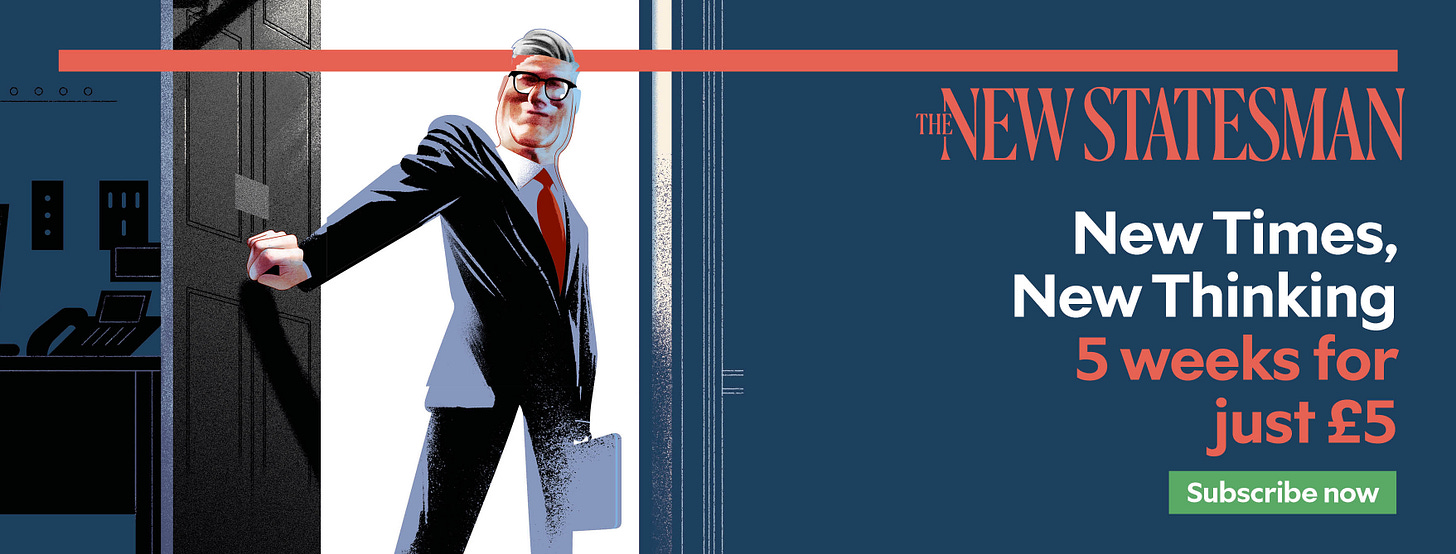Morning Call: In defence of Morgan McSweeney
It’s easy – and lazy – to blame advisers for the failures of politicians.
Good morning, Rachel here. It’s another Keir Starmer climbdown day, as the government last night announced huge concessions to its welfare reforms in a belated attempt to avoid a mega-rebellion next week. The biggest change is that existing personal independence payment claimants will be exempt from the new eligibility criteria, which will save around 370,000 disabled people the trauma of having their benefits cut. It’ll also cost Rachel Reeves £1.5bn, which the Chancellor – still trying to plug the £1.25bn hole left by the U-turn on the winter fuel allowance – will have to conjure from down the side of the Treasury sofa.
Despite this fairly big offer to the rebels, we still don’t know if the government has won over enough backbenchers to pass the vote on Tuesday. What we do know is: it’s a mess. A government with a three-figure majority a year into office should not be facing a parliamentary humiliation on this scale. We’ll be bringing you the latest in Morning Call and on the New Statesman website as the drama unfolds.
On the podcast yesterday, Andrew Marr warned that furious Labour MPs are calling for Reeves to go. Also in the firing line is Morgan McSweeney, Starmer’s controversial chief of staff. Below, I offer a defence of the unelected aide, and caution against blaming advisers for the failures of politicians…
This week’s Westminster main character is Morgan McSweeney – a high-risk position for any political figure to be in, but particularly dangerous for an unelected adviser.
Keir Starmer’s election coordinator turned chief of staff has become a target for Labour MPs’ anger at the welfare reform bill – on which the government now faces a rebellion that is veering on existential – and their general frustration at how quickly last July’s triumph has turned to ashes. The Times front page on Thursday led with demands for “regime change”, for which we can read “McSweeney’s head on a platter”, served with a healthy side dish of humble pie.
Criticisms of McSweeney include that he is arrogant, beset with tunnel vision, detached from the Parliamentary Labour Party and wider Labour movement, and obsessed with Reform to the point of taking Labour’s core left vote for granted. Above all, there is anger that his influence over the Prime Minister has pushed a government with a majority which should imbue a sense of confidence into positions that appear weak, indecisive and markedly un-Labour.
Cutting welfare by £5bn at the expense of some of the most vulnerable people in society epitomises the sense that the government has lost its way. And Starmer’s strategy of holding firm and staring down the left of his party to cement his authority has had the opposite effect. As one minister reportedly put it, “Morgan is completely off his rocker.” Another MP noted it is rarely sustainable once an adviser becomes a household name. Surely McSweeney’s days must be numbered?
A controversial adviser who antagonises MPs, restricts access to the prime minister and leads their government into impossible dead ends… stop me if you’ve heard this one before. Maybe you’re picturing Dominic Cummings and his Silicon Valley “move fast and break things” approach to governing, or Nick Timothy and Fiona Hill indulging Theresa May’s worst bunker mentality instincts. Or perhaps you’re casting your mind further back to the rows over such contentious New Labour figures as Damian McBride and Alastair Campbell. If McSweeney does go, he will be the latest in a long line of shadowy power-behind-the-throne figures whose presence in Downing Street became a scapegoat for the travails of the prime minister, and whose departure was demanded as proof of a change of course.
Cummings is a particularly useful comparison, not in terms of style (McSweeney has so far not vowed to fill Whitehall with “misfits and weirdos”), but because he too won his boss a glorious election victory which then crumbled upon contact with actual government. Writing in the aftermath of his resignation (or sacking – delete as appropriate) in November 2020, almost a year since the election that was meant to stabilise British politics for a decade, Catherine Haddon of the Institute for Government pointed to a “pattern of botched communications, badly-handled announcements, mixed messaging and leaked briefings which have dogged this government”. If any of that sounds familiar, note the period of calm, decisive, well-communicated government that followed Cummings’ exit from No 10. Oh, wait.
The concept of the wicked adviser who tweaks the puppet strings and manipulates the poor king into making bad decisions dates back hundreds of years – think Rasputin, Cardinal Richelieu, or the Persian grand vizier Jafar ibn Yahya, thought to be the inspiration for the villainous Jafar in Aladdin. Taking aim at them is a powerful way to signal discontent with a regime without criticising the leader directly. McSweeney himself should know that – look what happened when he clashed with Sue Gray.
But those baying for the blood of Starmer’s chief aide should pause. McSweeney’s pedigree is not as a policy adviser but an election strategist. His trademark move is using data to run ruthlessly targeted campaigns. In her book Taken as Red, which chronicles how Labour won the 2024 election, Anushka Asthana describes his work in the 2006 Lambeth Council elections when he realised Labour could triumph by winning over just 6 per cent of Lambeth’s total electorate. The fact the 2024 general election campaign was built on a tactic of spreading votes as widely as possible to win the most seats with the slimmest margins (what politics professor Rob Ford has called a “masterpiece of political jenga”) was not some error: it was McSweeney’s intention. A Labour leader who wanted to pursue a different strategy in government should have hired a different strategist.
It is notable, too, that before Starmer had properly settled into Downing Street McSweeney was already plotting the 2029 campaign. It’s important to have someone in government looking ahead to the next election; it is not wise to put them in charge. This is not a man who was ever intended to run the country, or to reform Whitehall single-handedly. Nor is he an expert in political communications – something everyone in Westminster agrees the government is truly dire at, and which has been a large part of its failure to sell its reforms to both the electorate and the parliamentary party.
On that subject, party management requires another skillset entirely. The welfare rebellion is a case study in how not to keep your MPs onside, with backbenchers talking openly of being sidelined by the leadership. The 2024 intake complains of being patronised and treated like the children; those already in the Commons talk of being overlooked for jobs, with barely a conversation to make them feel reassured and valued. There is frustration among both groups at the aloofness of the Prime Minister, who rarely turns up to vote himself. While the rebels have fierce ideological objections to disability cuts, at least some of the 120-plus MPs who have signed the wrecking amendment could have been brought onboard with a more conciliatory approach from Downing Street.
It is easy to pin this failure on an unpopular adviser, but who could seriously expect a campaign guru who sees politics in terms of raw numbers be the solution to a fractured and disheartened parliamentary party? That is not McSweeney’s job, it is the job of the Prime Minister. If Starmer has devolved that responsibility to a man fundamentally unsuited to it, that is his error. If he cannot tell a compelling story to the country and to his MPs about what he is doing and why, a personnel switch will salvage nothing.
Haddon warned back in 2020 that “changing the supporting cast is not enough to fix a stumbling premiership”. It would be easy for Starmer to scapegoat McSweeney over the welfare row. Fixing the foundations, to borrow one of the Prime Minister’s favourite phrases, will become that much harder.
Rachel’s picks
Will – who will be back in your inboxes with Morning Call on Monday – warns that the UK economy could be in big trouble if the ceasefire in the Middle East fails to hold.
Dishonesty now rules Scottish politics, writes Chris Deerin, as the state dissolves and populists rise.
Megan Gibson reviews Jacinda Ardern’s memoir, in which the former prime minister of New Zealand devotes more pages to her relationship with Prince William than she gives to an entire year of her premiership during the Covid pandemic.
And for something a little different, if you missed the “pageant of bad taste” that was Jeff Bezos’s Venetian wedding, Finn can fill you in.
Mailshot
Reuters: US says Beijing deal will expedite rare earth exports
Sky: Major search underway for 13-year-old boy near Teesside river
Chris Mason: U-turn hat-trick, and this is the most awkward yet
David A Graham: Trump’s deportations aren’t realistic
Jeremy Clarkson: Interview
Freya India: No one has a personality any more
And with that…
I hope you enjoyed this newsletter. As I wrote above, Will Dunn will be back on Monday. Have a great weekend,
—Rachel







May I comment on another article - the Bezos wedding abomination - this morning for which specific comments are not open?
Finn Redmond clearly does not know the real Venice at all. And I say that as someone who had a second home there for several years.
Yes: the main drags are swamped with tourists. But 90% of the city isn’t. Turn off the routes and you can get lost in the magic. Go off season (but avoiding the main acqua alta) and you can immerse yourself in even greater atmosphere & mystery. For every major cultural icon there are 100 lovely less known jewels to visit.
And the idea that you can’t eat well in Venice these days is just ill-informed rubbish. Of course, there’s terrible food to be found, as in most tourist cities, but I can give you 20 or more wonderful gastronomic addresses at different price points.
And don’t get me started on the joys of Burano, Mazzorbo, Torcello, even Murano …
Perhaps the people of the UK are annoyed beyond reason by cutting £5 billion from UK welfare at the same time as promising £3 billion a year to Ukraine in a 100-year partnership?
Perhaps they think that if you're going to use that money to save Ukrainian lives, you shouldn't be killing UK citizens to pay for it?
Who knows? Not Starmer, that's for sure.